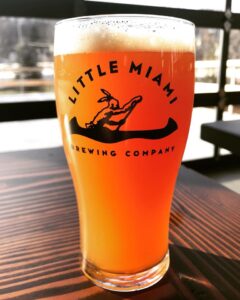Hops, as the name suggests, are the magical ingredient that can elevate your drink to new heights, making every sip an exhilarating experience that’ll have you hopping with joy. Hops are more than a plant, they are an essential component that gives craft beer its distinct flavor and character.
These bright green cones add a plethora of flavors and fragrances that enhance every brew, in addition to adding bitterness to balance out sweetness.
At Little Miami Brewing Company, we’re proud of the unique hops we use, making sure that every pint we make is a reflection of our dedication to quality.
We’ll talk about how important hops are to making great beer in this blog, and how different kinds of hops can affect anything from earthy undertones to flowery notes. Come along as we explore the amazing world of hops and how they may completely change the brewing process.
What are Hops and Why are they Essential in Craft Beer
Hops are the flower cones of the plant Humulus lupulus, which is a climbing vine that belongs to the family Cannabinaceae, native to Europe, Asia, and North America. These bright green flowers have traditionally been a significant brewing ingredient, highly prized for their unique properties.
Hops give beer its flavor, aroma, and bitterness, which makes up a large portion of its content. The diversity of aromatic components, which range from fruity and floral to earthy and spicy, enhances the feeling of vibrancy while the bitterness balances the maltiness of the brews.
Within the craft brewing industry, hops play a crucial role in shaping the style and personality of every brew. Experimenting with a wide variety of hop styles is crucial in creating distinct flavors and aromas, making hops a vital element in the art of craft brewing. Craft beer stands out from the crowd by displaying the distinct characteristics that only meticulously chosen hops can offer, thanks to creativity and innovation.
The Significance of Hops in the History of Craft Beer
The Heritage of Hops:
The inception of hops’ use in beer first appeared in Europe in the ninth century, and hops have been a part of beer history since then. Hops were first planted in Germany and quickly spread to other brewing regions of Europe due to their unique qualities and significance.
Brewers subsequently developed an understanding of hops’ flavor components, even though they were initially only used in beer for their preservative properties, which prolong the beverage’s shelf life by avoiding spoiling.
As a result, hops’ function as a preservative was transformed into a taste component, enabling brewers to start experimenting with the different hop possibilities available, which has added complexity and their beers have a richness of character.
The Revolution of Craft Beer:
The advent of distinct hop cultivars has been intimately linked to the late 20th-century craft beer trend. Craft brewers looked to a wide variety of hops to explore robust flavors and inventive brewing methods to differentiate their products from the competition.
In addition to bringing back popular types, this comeback has spawned innovative, hop-forward beers that highlight the remarkable adaptability and inventiveness of hops in the brewing process.
Importance of Hops in Artisanal Beer Production:
- Managing bitterness:
Hops are essential for offsetting the sweet flavor of malt with their bitterness. This interaction results in a balanced flavor profile, preventing the beer from being too sweet and improving its overall drinkability.
- Different scents and tastes:
Hops contribute to a variety of aromatic characteristics, providing aromas that are citrusy, piney, floral, or fruity. The variety of flavors is crucial in shaping the individuality of each craft beer, resulting in a one-of-a-kind drinking experience.
- Conserving and ensuring steadiness:
Besides their taste benefits, hops also act as a natural preservative, lengthening the lifespan of craft beer. Its antimicrobial qualities prevent the beer from spoiling, maintaining its freshness and flavor for an extended period of time.
- Improving the Entire Brewing Procedure:
Hops play a crucial role in creating harmony and intricacy in artisanal beer. By carefully adding different types of hops, brewers can develop complexity and subtlety, leading to a balanced and enjoyable end result.
The Science Behind Hops and Its Types:
The key chemicals in hops that contribute to beer’s increased bitterness are called alpha acids. These acids are broken down by heating during the brewing process, allowing for a balance between the amount of bitterness and malt sweetness.
Beta acids, a byproduct of hops that don’t provide bitterness, are known to affect the stability and aroma of beer. These substances also have a major role in enhancing brewing stability and complexity.
Essential oils found in hops are responsible for a craft beer’s distinct flavor. These oils, which are frequently generated during the brewing process, impart unique flavors and aromas to the beer and are essential to a brewer’s endeavor to craft brews with remarkable flavors.
The most common yet favorite Hops used food brewing craft beers are:
- Cascade: Having a strong floral and citrus scent most American craft beers are built on cascade hops, which contribute to their refreshing taste.
- Citra: Hop enthusiasts appreciate Citra because of its tropical characteristics, which include hints of mango, papaya, and grapefruit.
- Centennial: Often referred to as the “super Cascade,” these have a powerful citrus flavor and a well-balanced bitterness that adds character to a variety of beer types.
- Simcoe: The most common description of Simcoe hops is probably “earthy, pine, and berry impressions that help define complexity, adding depth and richness to many craft beers.”
At Little Miami Brewing Company, we use a wide variety of hop species, including very unusual ones that truly contribute to the particular flavor of our beers. High-quality hops guarantee that every brew is a manifestation of inventive passion and authentic craftsmanship.
Single-hop beers showcase the qualities of a single-hop variety, allowing enthusiasts to savor the unique flavor. Multiple types are used in multi-hopped beers to achieve a layered flavor profile. With complex smells and flavors that entice the palate, this mix perfectly highlights the unique qualities of the hops.
The Use of Hops by Little Miami Brewing Company:
At Little Miami Brewing Company, we have a few staple brews that very creatively highlight some amazing utilization of hops. Experience our “Harvest Moon”, which brilliantly combines the flavors of Citra and Cascade with bursts of tropical fruit and flowery notes. There’s the “My Dad’s Truck”, A proper and righteous Hazy IPA, with an obscene amount of hops!
In our craft brews, we take great pride in using the finest hops. We can guarantee that the fresh, flavorful hops in our brews enhance the flavor and aroma of each beer since we collaborate with excellent hop producers.
Everything we do is based on the quality concept of making the best-tasting beers possible for you. Many of the excellent beers that have strong hop features have truly sparked a new interest in our greatest beer geeks.
We at Little Miami Brewing Company are positive about hops’ future. We have numerous forthcoming releases in the works that incorporate experimental hop types. Hops are essential to the craft beer industry, impacting everything from flavor and aroma to preservation. Their distinct qualities enable brewers to produce a wide variety of types to suit every taste.
Come explore the skill of brewing with us at our taproom and learn how we use hops to create remarkable brews. To tantalize new tastes and thrilling brewing journeys meet us at 208 Mill Street, Milford, Ohio 45150 and can reserve in advance for the whole group via Group Reservations: reserve@www.littlemiamibrewing.com!




